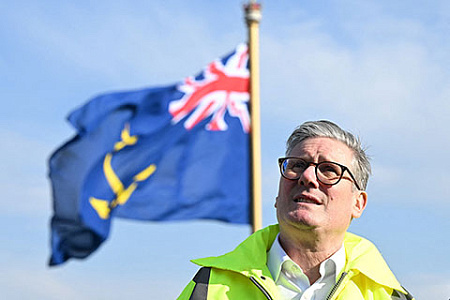
The ratings of British Prime Minister Keir Starmer have increased by 10% since the return of US President Donald Trump to the White House, London media reported. The success of the head of the British cabinet is directly attributed to the fact that he was able to establish contact with the American leader, while continuing to support Ukraine. The fact that Trump is able to influence the ratings of foreign politicians in a positive way can be seen in the example of Canada. The Liberal Party scored points there, despite numerous mistakes in domestic policy.
30% of Britons would prefer the Labor Party to solve the country’s foreign policy problems rather than representatives of the Conservative Party (18%), according to an Observer poll. Ratings of disapproval of Starmer’s work dropped from 33% to 23%. Although, of course, the prime minister’s work still does not suit many Britons, especially with regard to domestic politics, the attitude towards him has obviously changed for the better. And this is despite the fact that traditionally it was the Tories who were considered supporters of a tougher and more thoughtful line on the issue of national defense.
But, as they say, everything is learned by comparison, and in this case, the comparison for the British was none other than Trump. It was not the businessman’s arrival in the White House that became the catalyst for Starmer’s ratings, but his views on the Ukrainian conflict. The British prime minister made the expected move – he began to assure voters that support for Ukraine should continue, regardless of the position of the White House. This was understood not only by ordinary Britons, but also by members of the House of Commons.
However, with all this, the British prime minister managed to establish good relations with Trump. This is important for the British, because Downing Street, no longer part of the EU, hopes to avoid the duties that Washington imposes on European countries, and London seeks to conclude a trade deal that Trump promised Boris Johnson.
Nevertheless, it is surprising in the discovered trend that the ratings of the British politician, in fact, have become directly dependent on Trump. In other words, the American president has become an influential factor not only in American and international politics, but also in the domestic politics of other countries.
Trump may leave the Liberal Party in power in Canada. Parliamentary elections are scheduled to take place before October this year. The ratings of the ruling party were catastrophically low. But then Trump came to the White House and began aggressive rhetoric against Canada. And the liberals, led by outgoing Prime Minister Justin Trudeau, who lost their ratings, began to be perceived by Canadians as worthy defenders of national interests, despite failures in social and migration policy. Now they have a chance to beat the local conservatives, who were already considered favorites of the parliamentary elections.
At the same time, those whom Trump considers good partners may find themselves in a difficult position. After all, the head of the White House can do them a disservice. In a sense, this happened to the head of the Reformist Party of Britain, Nigel Farage. By the time Trump came to power, his ratings were quite high. After information about possible financial support for Elon Musk, the British media even expressed concerns that the reformists would become the second most powerful political party and oust the conservatives as the main proponents of the right-wing agenda. But, according to YouGov, Farage has lost his popularity largely due to the fact that 80% of Britons now have a negative attitude towards Trump. Recall that Farage helped the Republican get re-elected. In other words, Trump’s sympathies can put a “black mark” on a particular foreign policy instead of increasing his ratings.
